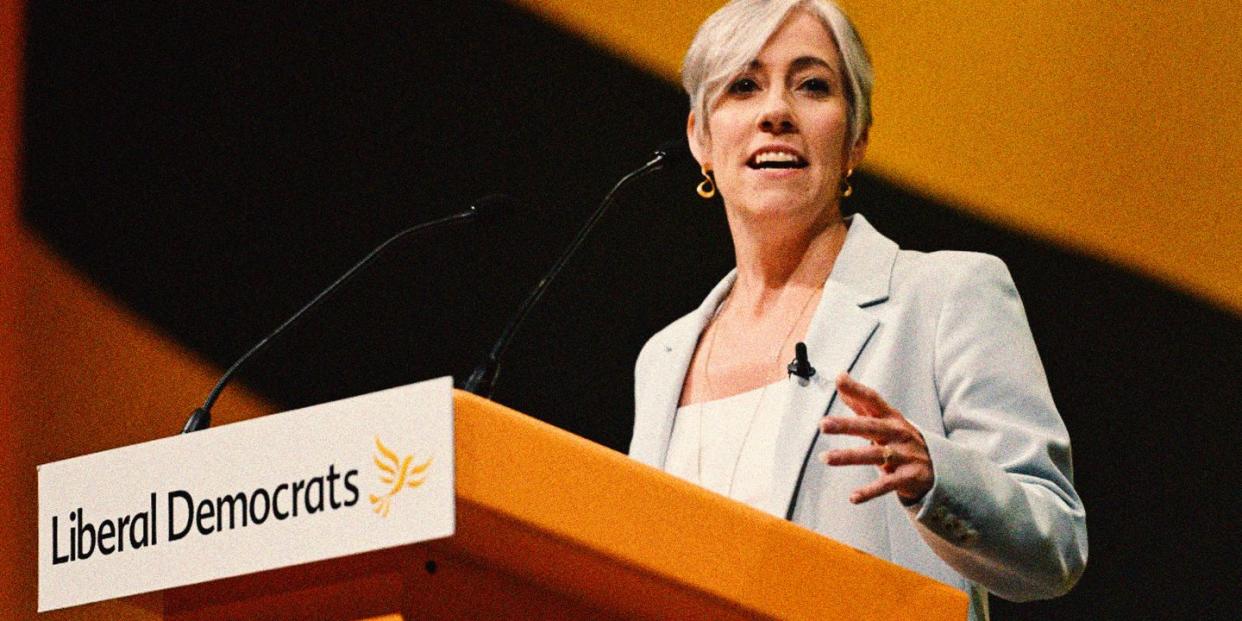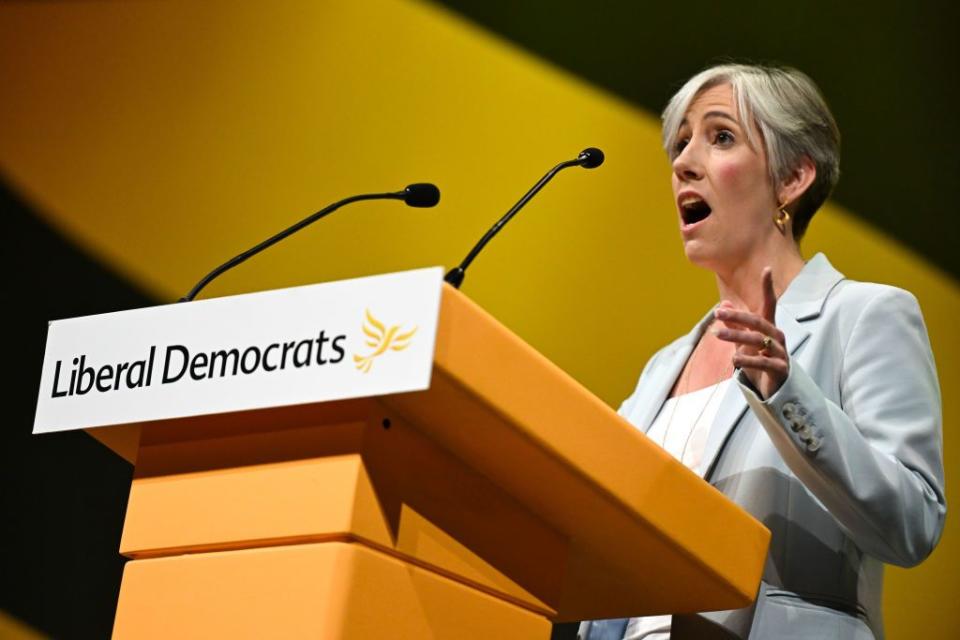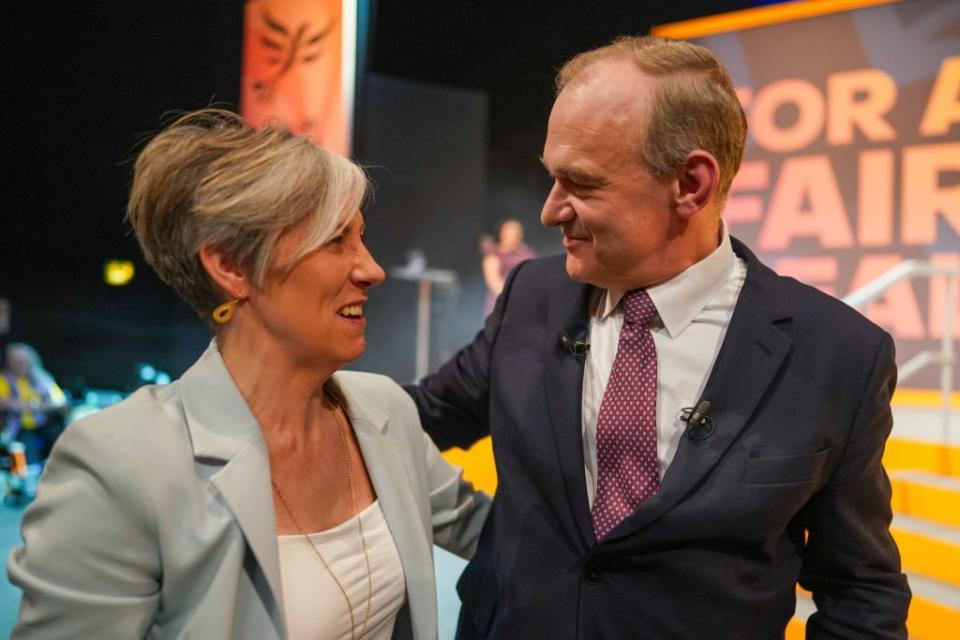Can the Lib Dems ever escape the ghost of tuition fees past? Daisy Cooper thinks so

If you're a millennial like me (hiya), it’s likely your first thought when you hear the words 'Liberal Democrats' or see an orange rosette are 'tuition fees', possibly followed by an expletive. As a reminder: former party leader, Nick Clegg, saw record success in 2010 when live TV debates began, with his pledge to scrap student fees leading to huge support from young voters – but within months of forming a coalition government with the Conservatives, a vote to increase tuition rates was passed. Hello lifelong debt for many, goodbye to the Lib Dems' reputation and popularity
But current deputy leader of the party, Daisy Cooper, tells Cosmopolitan that they're determined to shake off the shackles of the past and, in a candid turn of events not usually associated with politicians, admits that previously the Lib Dems haven’t delivered. And that they deserved to be called out for that.
It's worth noting that back in 2010, 21 Lib Dem MPs did stage a revolt (along with six Conservatives) and eight abstained when the Tory government voted to raise tuition fees, but 27 (party ministers included) still backed the motion.
"When the Lib Dems were in coalition with the Conservatives, we fought them every single day – we won some of those battles and we lost some of them," Cooper admits. "Tuition fees was one of the battles that we lost, and quite frankly, we paid the price and that's democracy. If you make a promise and you can't keep it, then the public can punish you."
*Everyone turns to look at Rishi Sunak*
Cooper caveats that the Lib Dems "did at least give more support to students on lower incomes to [ensure they] had the opportunity to go to university" but points out that since 2015 "the Conservatives have not only driven the university sector into the ground, but withdrawn those very grants we made sure were in place to help". [A Liberal Democrats spokesperson later added that the party, whilst in coalition with the Tories, secured increases in the value and availability of maintenance grants, so that students from households earning less than £39,000 had more up-front support with living costs – something the Conservatives scrapped a few years later].
More recently, Cooper also adds, the Lib Dems were "the first to call for a windfall tax on oil and gas companies raking in billions while ordinary folks couldn't afford to pay their energy bills" and that the party has spent three years calling out big water companies pumping sewage into rivers with impunity.
So, is it time we reconsider the ones in orange?

This time around, Cooper is clear that Gen Z and millennial votes are just as key for the party as they were back in 2010. "After the lying and law breaking of Boris Johnson, when so many, particularly young people, were making sacrifices – at school, university and the start of their working lives [...] For a lot of younger people, this might be the first time that they actually have the opportunity to vote and after everything that has happened, this is the election where their votes can really, really matter."
Social media is more important than ever in this election too, which is why, Cooper explains, you might have seen party leader, Ed Davey, wobbling around on (or indeed falling off of) a paddle board on your feed. Cooper stresses there's a method behind this madness, but it's debatable as to whether or not the majority of voters have understood there's a message beyond the memes.
"We've said before that we take our politics very seriously, but we don't take ourselves that seriously as politicians," Cooper says enthusiastically. "Many people will have seen Ed Davey falling off a paddle board to highlight the scandal of raw sewage dumping in our rivers and streams. We did that stunt deliberately to highlight that issue."
Elsewhere and jokes aside, many will have also been moved by Davey's intimate video revealing his home life where he cares for his son, John, who has severe learning and physical disabilities, and discusses the loss of his parents at a young age. Davey, who was previously business minister between 2010 and 2012, has also been questioned over his response to the Post Office scandal, having initially refused to meet with justice campaigner Alan Bates. Davey has since apologised, saying he was "sorry he did not see through the Post Office's lies" initially and in 2015, the Lib Dems criticised the Tory government for being too slow to compensate victims.
As the "party with a human face", the Lib Dems also want to reach out to women in particular. "Young women especially are facing huge pressures at the moment, because women more broadly still take on the lion's share of caring, and as people live longer, women in particular often end up caring for young children and for older parents at the same time, while trying to make ends meet," Cooper explains.
She adds, "Increasingly, women are the ones picking up the pieces of a broken social care system and a broken education system. At this election, we have a plan to fix our NHS, to invest in children and schools, and to finally fix the crisis in social care, so that all people – but especially women – have the opportunity to to work, earn money, and get on with their lives without public services collapsing around them."
As for her own journey into politics, Cooper, who is now 42, says she didn't join the party until her late twenties – around the same age that many of those who were students at the time of the 2010 election, with high hopes of getting a free degree, are now. She herself has a law degree from Leeds University and a masters on the same subject from Nottingham University.

"I grew up in a household where my family were very anti Conservatives, but it was only really in my late twenties that I decided to get involved in party politics," Cooper says.
The move was sparked while she was lounging around on the sofa one weekend. "I was watching one of these Sunday morning TV programmes, it was actually a Labour government at the time, and they were trying to bring in what I felt were very deeply illiberal measures. I didn't like some of the things they were saying about introducing 'stop and search' and detaining people for 42 days without charging them. You should treat every single individual on their own merits, and so I joined the Liberal Democrats and decided I wanted to become an MP."
After going through the approval process, Cooper stood for election a couple of times in seats where she "didn't have a great chance of winning", but persevered and worked her way up through the ranks, finally getting elected in St Albans in 2019.
"Fundamentally, if you care about people, and you have a fire in your belly to try and change the world around you, then politics is a really good route to doing that," she reflects.
When it comes to the polls, according to one (carried out by Savanta and The Telegraph), the Liberal Democrats are predicted to win 50 seats – just three less than the Conservative party. Whilst of course in a dream world for Cooper, the entire country would vote orange, she's pragmatic about the facts.
"Tactical voting will play a significant role in this election. During the last five years, there were multiple by-elections around the country which Liberal Democrats won," Cooper says. "But we wouldn't have if it weren't for those Labour and Green voters who were prepared to lend their votes in those particular seats, that was really important."
She reminds that the Lib Dems are running a candidate in every single constituency, but says as a political party there's a limited amount of resource and they are focussing on the areas where they're in second place – big efforts are being made to usurp Tory candidates within the 'Blue Wall' (places in southern England, including Putney, Guildford and Canterbury, seen as more likely to switch from the Conservatives).
"As a Liberal Democrat, of course I want people to vote Liberal Democrat wherever they are," Cooper shares. "But it's up to voters themselves. If they want change, they can make up their own minds about who [can deliver that best for them]."
You can read more on the Liberal Democrats' manifesto, along with promises from all the key parties, here.
Follow Jennifer on Instagram and X
You Might Also Like

 Yahoo News
Yahoo News 
